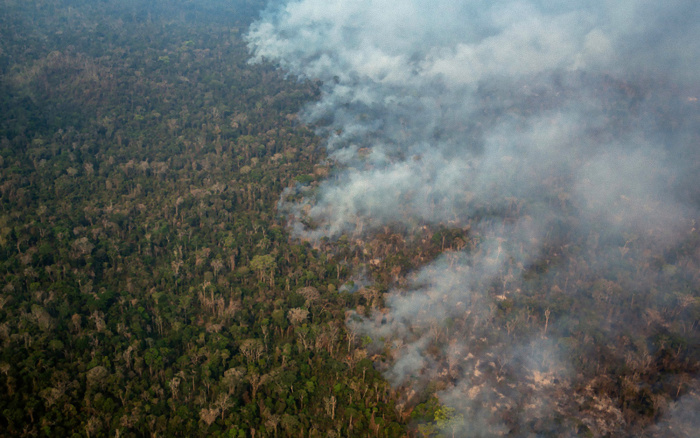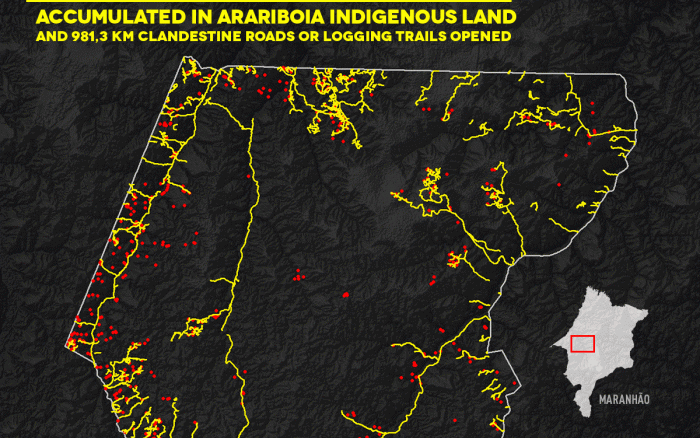Você está na versão anterior do website do ISA
Atenção
Essa é a versão antiga do site do ISA que ficou no ar até março de 2022. As informações institucionais aqui contidas podem estar desatualizadas. Acesse https://www.socioambiental.org para a versão atual.
Araribóia Indigenous Land suffers with violence, invasions and deforestation
quinta-feira, 07 de Novembro de 2019 
Esta notícia está associada ao Programa:
Monitoring bulletins published by ISA indicate over 1,240 km of illegal branch roads and 4,863 deforestation alerts in one year in the territory where forest guardian Paulo Paulino Guajajara was brutally murdered
Satellite images indicate an unprecedented wave of invasions and theft of timber on the Araribóia Indigenous Land, a territory where forest guardian Paulo Paulino Guajajara was brutally murdered last Friday (1/11).
Analysis by Instituto Socioambiental (ISA) found at least 105 km of clandestine roads or logging trails opened in October 2019 alone. In addition to the branch roads, 258 alerts for illegal logging were detected. ISA conducts monthly monitoring of threats to the territory. This information underpins actions in the field for the guardians of the forest, an indigenous group created to protect the territory, of which Paulo Guajajara was a member.
Since this monitoring began, in September 2018, 4,863 alerts and 1,248.5 km of branch roads have been detected.
On Friday, Paulo Paulino Guajajara and Laércio Guajajara were ambushed while hunting within the Indigenous Land, in the region of Lagoa Comprida. Laércio was injured in the attack, but was able to escape. Paulo was struck in the face and died instantly. After hiding in the forest, Laércio ran for 10 km before finding help, according to information from Agência Pública. The two were members of the guardians of the forest.
The fact that the crime occurred on indigenous land is even more serious because it violates the indigenous people’s exclusive right to their territory, as provided for in subparagraph 2 of article 231 of the Constitution.
The crime was widely covered in Brazil and abroad, with reports in major international news publications, like The Guardian, New York Times and many others. The Regional National Indian Foundation (Funai) of Maranhão requested support from the National Public Security Force in the region. In turn, the state government of Maranhão issued a decree providing for emergency state action to face threats on indigenous lands, when requested by the National Indian Foundation (Funai), Ibama, Federal Public Defender’s Office (DPU), Federal Police, Federal Prosecutor’s Office (MPF) or State Commission for Public Policies for the Indigenous Peoples of Maranhão (Coepi/MA).
Meanwhile, the guardians of the forest are still under threat. Approximately 26.4% of the branch roads found in the analysis by ISA is located in Lagoa Comprida, a region where the crime occurred.
The invasions, illegal logging and violence in Araribóia are nothing new and have been exhaustively denounced by indigenous people for years. But since the election of President Jair Bolsonaro (PSL), an explosion in the number of alerts of branch roads and reports from the guardians of the forest in the field has occurred.
In this scenario, in addition to the real threat to the guardians of the forest and to the Guajajara indigenous people, the lives of the isolated Awá Guajá are also at stake. These are groups that have had little or no contact with other indigenous or non-indigenous peoples, who obtain everything they need to survive from the forest: game, water, fruit, honey, etc. As the forest disappears, their way of life is increasingly threatened.
In September 2018, Guajajara filmmakers captured exclusive footage of their isolated relatives in the forest. They used this footage to create the film “Ka’a azar Ukize Wà: The Owners of the Forest in Danger”. Respecting the will of the Awá Guajá to not be contacted, the film warns of the delicate situation of these indigenous people on the Araribóia Indigenous Land. The guardians of the forest report that logging roads have been identified in the region where the scenes were recorded, where the isolated indigenous people had been camped, which makes the protection of this territory and the people who live there even more urgent.
Clara Roman
ISA
Imagens:






